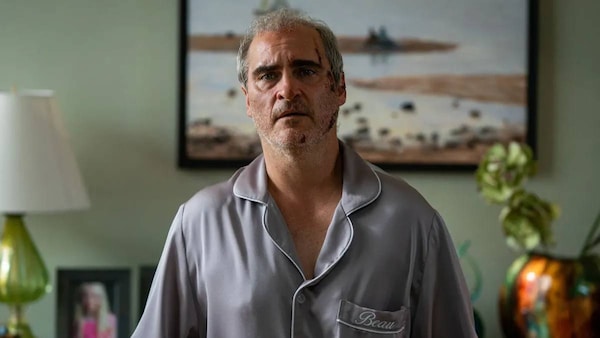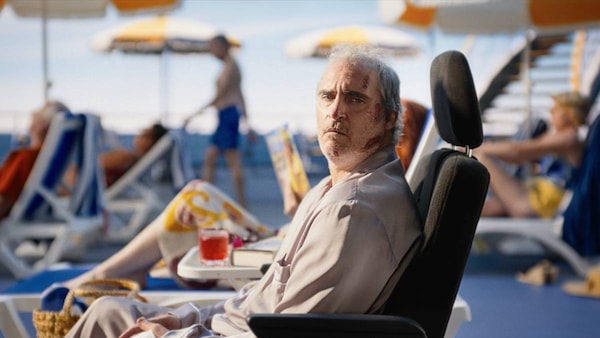In Beau Is Afraid, Ari Aster Mines Despair For Horror — & Comedy
In Ari Aster's film, a 49-year-old virgin (Joaquin Phoenix) is forced to battle his crippling anxieties and confront his repressed trauma on a journey home to meet his mom. Prahlad Srihari reviews.

Last Updated: 02.32 PM, May 27, 2023
ARI ASTER’s third film Beau Is Afraid is a surrealist rendition of the old Freudian slip joke about saying one thing but meaning your mother. Put simply, it is not an out-and-out horror film like the American writer-director’s first two outings, but a comedy. A broad and unwholesome comedy about existential tail-chasing as a chronically anxious 49-year-old virgin (Joaquin Phoenix) is forced to battle through his crippling anxieties and confront his repressed trauma on the journey home to meet his mom.
Sitting through 178 minutes of Joaquin Phoenix besieged by deranged vagrants, homicidal war veterans and a giant penis is like circuit training for the nerves. The film operates in a tragicomic register entirely its own. Anxiety triggers are used as conceptual scaffolding onto which comical situations of sheer cinematic lunacy are built. Aster brings audiences to the threshold of a nightmare and undercuts its horror with humour. You may cringe. Your patience may be tested. But you will find yourself thinking about it — for it is an experience that is difficult to shake — so much so that it will redraw your comedic boundaries.
As the title announces, Beau is afraid. Of just about everything. His response to any threat, real or imagined, is to flinch, crouch, shake, wail, puke or run away. The only place he feels safe is alone in the figurative womb that is his run-down Manhattan apartment. Coming home from therapy or going out for a bottle of water is staged like navigating the frontline of a warzone. Every fear of this deeply paranoid man-child caught in a sustained flight-freeze-fawn response transmutes into hostile forces. On every corner, a threat lies in wait: criminals, junkies and hobos run riot on streets; news reports speak of a butt-naked serial killer piling up a body count; garbage rots and burns; a kiosk offers “guns aplenty”; graffitied walls call for the death of children. Beau’s fears, in all their grotesque hybridity, warp society into a veritable dystopia. All this unfolds like a fever dream catalogued after passing out and waking up. Watching it in a theatre is advised because we are forced to surrender to Aster’s dizzying fantasia without the luxury of pausing.
Fear came not only from demonic forces and murderous cults in his previous films, but from confronting the truth of trauma. Annie, in Hereditary, is a mother struggling to make amends with her son after their family is fractured by grief and intergenerational trauma. For Dani, a young woman who has just lost her entire family in Midsommar, travelling to a remote Swedish commune becomes a transformative experience that allows her to navigate her repressed trauma rather than keep it buried. Annie and Dani could have benefited from trauma therapy. But even therapy proves insufficient for Beau.

On being invited inside Beau’s head, we become privy to his painful memories, hypersymbolised for the screen. Playing passenger on his chaotic inner journey is like inhabiting an anxiety attack so overwhelming all you can do is laugh. Laughter may not always be resounding and sometimes takes the form of half-delighted snorts edged with squirming unease. Aster’s absurdist brilliance lies in his flair for escalation i.e., pushing setups well past their logical limit to capture the emotional reality of being Beau. The mercurial logic of its comedy serves as a tool of disruption, never allowing the viewer to settle into a comfortable relationship with the film. Thereby, an emergent horror auteur proves himself to be just as prodigiously gifted in the comedy of visceral discomfort.
Just as he got the best out of Toni Collette in Hereditary and Florence Pugh in Midsommar, so he does here with Phoenix, who is spectacularly unhinged as Beau. Anxiety, that nightmare of being walled up inside one’s own spiralling mind, has seldom looked this debilitating on screen. Phoenix plunges us into the unconscious of a sad sack plagued by over-revving neuroses, tapping into the character’s interior and exterior emotional extremes in a performance that will make the Clown Prince of Crime look buttoned-up.
Beau’s journey to meet his mother Mona (Patti LuPone as older, Zoe Lister-Jones as younger) is interrupted by a variety of obstacles that speak directly to his hang-ups. A wealthy suburban couple (Amy Ryan and Nathan Lane) holds him hostage in their pastel-coloured home which is no less nightmarish than the decaying cityscape he flees from. The couple’s snooty teenage daughter (Kylie Rogers) urges him to kill himself by drinking a can of paint. Brief respite from the nightmare comes when he runs into a travelling theatre troupe in the woods. A stop-motion animated sequence whisks Beau into a storybook fantasy where he is liberated from his castrating mother, enjoys an anxiety-free life with a wife and three sons on a farm, and experiences some measure of catharsis.
Freud would have been licking his lips if he had a chance at psychoanalysing such a subject. The film opens with a POV shot of baby Beau exiting his mother’s birth canal. The next scene finds an adult Beau seated on a sofa in his therapist’s office. The therapist (Stephen McKinley Henderson) quizzes Beau if he ever wished his mother was dead — to which he is a little too quick to register protestations. Beau is prescribed an experimental new drug — and off he goes. Aster places us at the centre of a subconscious map with mommy being the only guiding coordinate.
Though we don’t see a whole lot of mommy, the trauma caused by her guilt-tripping, smothering and manipulating are discernible in Beau’s anxieties. We see it in his resistance to going outside his house. We see it in how he lives his life like he needs constant direction from an inner mom-ologue. A scene where he loses his keys, misses his flight and can’t figure out what to do next reveals an unwillingness to make any decisions on his own. Later, when he is standing in a sinking boat but can’t find a way to escape, it illustrates his paralysing dependence on her. Aster approximates Beau’s mental state through image and sound so we feel what he feels. But the interplay between intimate close-ups and distancing wide shots ensures the tragedy of his life still plays like a farce.
One of the more farcical scenes is made all the more so by a seemingly out-of-place Mariah Carey needle drop. On making the torturous journey home, Beau reunites with his long-lost childhood crush Elaine (Parker Posey). The two move the reunion to his mother’s bed where he loses his virginity to the jaunty midtempo ballad “Always Be My Baby”. Though on edge throughout, he climaxes for the first time as Carey do-do-doops and do-doop-da-dums. “You just blasted through that bag (condom)”, Elaine commends on his long-held liberation.
If it took Beau so long, it’s because his overbearing mother had scared him into believing that experiencing “the little death” could end with his literal death. As a child, Beau is cursed by his mother with the knowledge that his father died the very moment he was conceived, as did his grandfather and great-grandfather. The fear of suffering the same fate instils in Beau a lifelong fear of sex. Contrary to his belief, Beau survives his first orgasm. In a cruel twist of fate, Elaine doesn’t, freezing up in rigor mortis the second she climaxes. As Mona had warned Beau, sex does prove lethal. The needle drop feels less out of place and almost fitting: as it reminds him, he will always be her baby.

